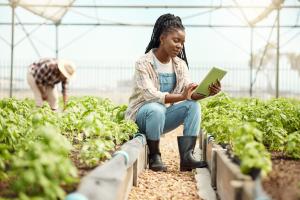Report examines issues including climate, food safety, health, and nutrition, while showing paths to help Africa get on track to achieving CAADP-Malabo goals.
KIGALI, RWANDA, November 27, 2023 /EINPresswire.com/ — African countries must urgently accelerate the use of climate adaptation technologies and practices in agriculture to safeguard economies against rising climate impacts, a new report finds.
With evidence showing that climate shocks and extreme weather contribute significantly to food insecurity in Africa, the report finds that climate-smart agricultural practices have the potential to lessen the negative economic impacts of climate change, provided African countries scale the use of climate adaptation tools, including climate-resilient and high-yielding crop varieties, as well as soil and water conservation measures.
The critical role of data is among the highlights of the 2023 Regional Strategic Analysis and Knowledge Support System (ReSAKSS) flagship Annual Trends and Outlook Report (ATOR). Themed “African Food Systems Transformation and the Post-Malabo Agenda,” the report analyzes opportunities for transforming Africa’s food systems across various themes, including climate adaptation, health, nutrition, food safety, science and technology, data needs, and more, with forward-looking recommendations to inform the post-Malabo agenda. The report will be launched during the 2023 ReSAKSS conference in Kigali, Rwanda, from November 27 to 29, 2023.
“Despite the impressive progress since 2003, Africa in 2023 faces both persistent and new challenges. The post-Malabo agenda for CAADP implementation must further deepen the focus to respond to emerging issues and meet the needs of sustainable food systems transformation in a context of accelerating climate change and multifaceted stressors and shocks,” said Dr. Ousmane Badiane, Executive Chairperson, AKADEMIYA2063.
“It is our hope that the 2023 ATOR will contribute to the development of a robust post-Malabo agenda which will provide a framework for sustainable food systems transformation for years to come”.
Africa must also accelerate progress on food safety, the report argues, despite some positive trends in establishing continental and regional initiatives for strengthening food safety systems. For instance, the report shows how significant gaps remain in generating credible evidence and data for state-of-the-art risk assessments, establishing a strong food safety culture and norms, and developing capacities to formulate and implement much-needed food safety regulations.
The report calls on African governments to expedite the establishment of an Africa Food Safety Agency by the African Union Commission, while also implementing recently established continental and regional food safety strategies and improving data gathering.
The authors lay out specific steps African governments can take to fill persistent data gaps limiting their ability to sustainably and resiliently transform food systems to meet pressing challenges such as climate change and food insecurity.
For instance, the report highlights how data systems on African food systems continue to face a number of blind spots, including a lack of gender-disaggregated data and significant variety in the quality of data collected by national databases as a result of institutional and financial obstacles.
African governments can overcome these barriers by increasing funding for data gathering and management, investing in strengthened data capacities and tools, and promoting greater coordination among food system data users and suppliers.
“As Africa moves to overhaul its food system transformation in the face of escalating climate impacts and a myriad of other challenges, more and better data will be needed in navigating through the complexity of these challenges,” said Dr. John Ulimwengu, Senior Research Fellow, International Food Policy Research Institute (IFPRI), and Co-Editor of the 2023 ATOR.
“Greater coordination across various data streams, coupled with the development of common indicators, is envisioned as the cornerstone for this transformation. This holistic approach will not only illuminate priority areas for policy and funding but also catalyze progress towards CAADP/Malabo goals.”
Finally, the report also shows how more African countries are making progress in implementing the Comprehensive Africa Agriculture Development Programme (CAADP), yet further work is needed to ensure the bulk of these goals move on-track.
The number of countries that drafted, validated, and submitted biennial review (BR) reports to track their progress across the CAADP has increased in recent years, from 47 in the first BR cycle to 51 in the third BR cycle in 2021.
Yet, trends indicate that Africa remains off track to meeting the Malabo goals by 2025, which includes targets such as ending hunger by 2025, halving poverty through agriculture by 2025, and more.
“While it is encouraging that more African countries are making progress in CAADP implementation, more work is clearly needed to achieve the goals as envisioned in the Malabo Declaration,” said H.E. Josefa L.C. Sacko, Commissioner, Department of Agriculture, Rural Development, Blue Economy, and Sustainable Environment, African Union Commission.
“The next phase of CAADP implementation must build on the successes of the past and help Africa recapture its growth momentum to accelerate progress toward its goals. African policymakers and stakeholders must be armed with quality data to translate policy into effective action; therefore, we welcome the consolidation of knowledge through the 2023 ATOR, especially amid the complex field of food systems, which face a myriad of interconnected challenges.”
ENDS
Notes to editors
For further information and an embargoed copy of the ATOR report, please contact:
Dr. Layih Butake
Director, Communication and Outreach, AKADEMIYA2063 [email protected]
+221 773235609
Matthew Stafford
Marchmont Communications [email protected]
+44 (0) 7788 863692
About the Regional Strategic Analysis and Knowledge Support System (ReSAKSS)
Established in 2006 under the Comprehensive Africa Agriculture Development Programme (CAADP), the Regional Strategic Analysis and Knowledge Support System (ReSAKSS) supports efforts to promote evidence and outcome-based policy planning and implementation. In particular, ReSAKSS provides data and related analytical and knowledge products to facilitate CAADP benchmarking, review, and mutual accountability processes.
AKADEMIYA2063 leads the work of ReSAKSS in partnership with the African Union Commission (AUC), the African Union Development Agency (AUDA-NEPAD), and leading Regional Economic Communities (RECs). The mission of AKADEMIYA2063 is to provide data, policy analysis, and capacity-strengthening support to enable African Union (AU) Member States to achieve economic transformation and shared prosperity in support of the AU’s Agenda 2063. As the main platform for monitoring CAADP implementation, ReSAKSS tracks the progress of core CAADP indicators through an interactive website and a flagship Annual Trends and Outlook Report (ATOR), the official CAADP monitoring and evaluation (M&E) report. In addition to tracking progress on CAADP core indicators, the ATOR presents analysis on a feature topic of strategic importance to the CAADP agenda each year. For more information, visit: https://conference.resakss.org/; www.akademiya2063.org.
Matthew Stafford
Marchmont Communications
email us here
![]()
Originally published at https://www.einpresswire.com/article/671135931/africa-must-leverage-research-innovation-evidence-to-inform-sustainable-food-systems-transformation-new-report-finds





